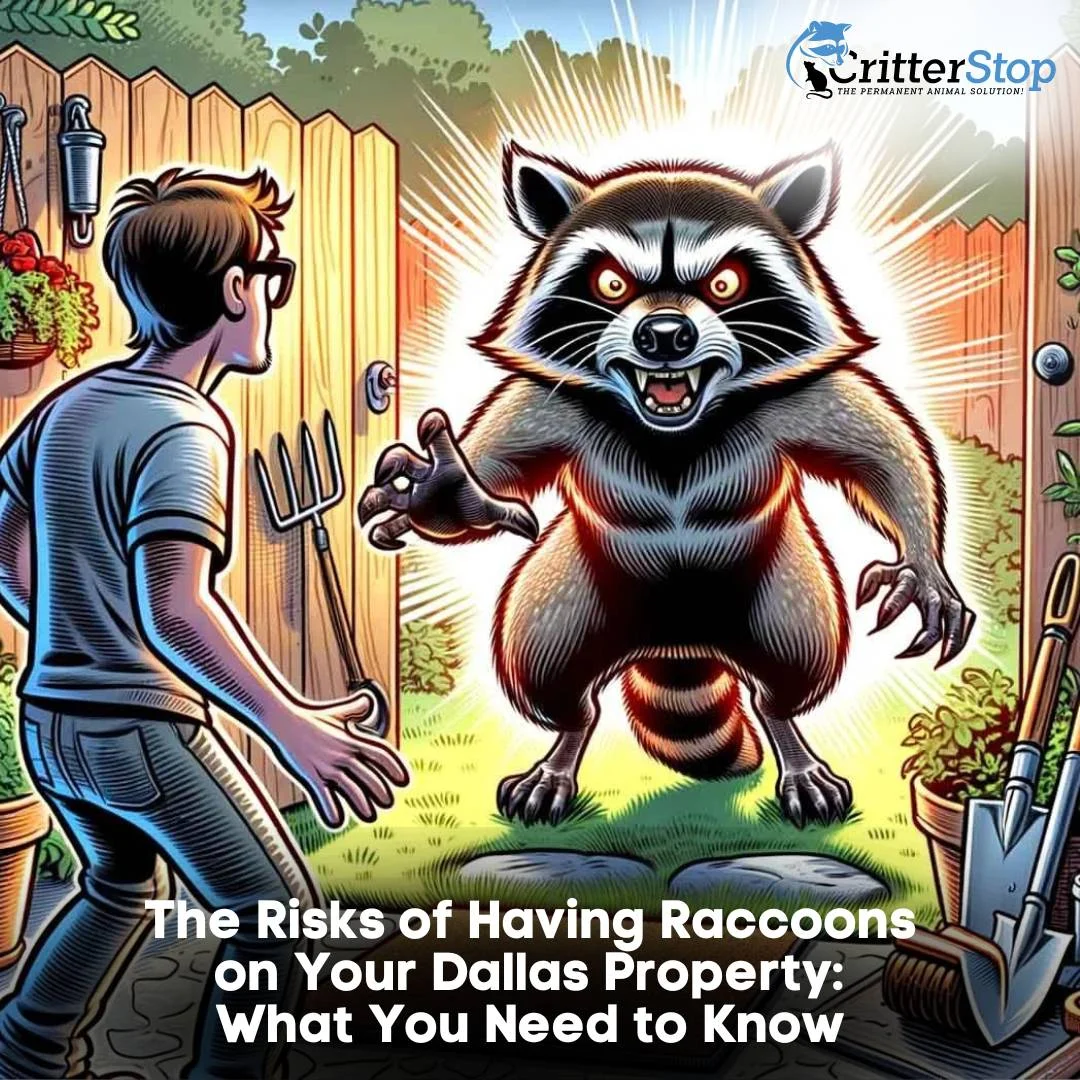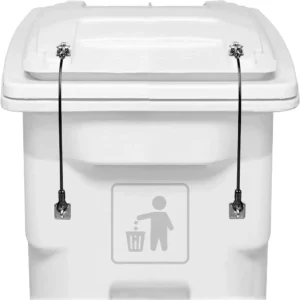
Raccoons may seem cute and harmless from afar, but when they invade your Dallas property, they can pose numerous risks and become a nuisance. It's essential to understand these masked bandits and take necessary steps to protect your home. In this article, we will delve into the fascinating world of raccoons, their behaviors, and the potential dangers they can bring to your surroundings. We will also explore effective ways to keep raccoons at bay and discuss safe and ethical methods for dealing with these intruders.
When it comes to wildlife in Dallas, raccoons are one of the most recognizable and commonly encountered creatures. Known for their distinctive black mask across their eyes and ringed tails, raccoons have captivated people for years. However, it's important to remember that raccoons are wild animals, and their natural behaviors can pose significant risks to both humans and pets.

Raccoons, scientifically known as Procyon lotor, are highly adaptable mammals that thrive in various environments, including urban areas like Dallas. Their intelligence and problem-solving skills are well-documented, making them curious and resourceful animals. Raccoons are primarily nocturnal, meaning they are most active during the night.
These creatures are omnivores, feeding on a wide range of food sources, including fruits, vegetables, insects, small mammals, and even garbage. Their dexterous paws enable them to manipulate objects and open containers, further solidifying their reputation as skilled foragers.
Raccoons have a fascinating social structure. They are typically solitary animals, but during the mating season, which occurs from January to March, they form temporary groups. Female raccoons, called sows, give birth to a litter of 2-5 kits, which they raise in a den. The kits stay with their mother for about a year, learning essential survival skills before venturing out on their own.
There are several different species of raccoons, but the most common one found in Dallas is the North American raccoon. These raccoons have adapted well to urban environments and can be found in parks, neighborhoods, and even city streets.
Generally, raccoons are not aggressive unless provoked or feel threatened. However, when a raccoon takes up residence on your property, they can exhibit certain behaviors that may be problematic. These behaviors can include rummaging through garbage cans, garden destruction, and even entering your home. Such behaviors not only cause property damage but also increase the risk of disease transmission.
Raccoons are known carriers of the raccoon roundworm, which can be transmitted through their feces and pose health risks to humans and pets. Additionally, raccoons can carry diseases such as rabies, which can be fatal if left untreated. Recognizing dangerous raccoon behavior is crucial to ensuring the safety of your family and pets.
It's important to note that raccoons are protected wildlife in many areas, including Dallas. Therefore, it's essential to contact a professional wildlife removal service if you are experiencing issues with raccoons on your property. These experts can safely and humanely remove the raccoons and implement preventive measures to avoid future encounters.
Remember, while raccoons may be fascinating creatures to observe from a distance, it's best to admire them from afar and take the necessary precautions to keep yourself, your family, and your pets safe.
When it comes to mitigating the risks associated with raccoons, prevention is key. By implementing simple safety measures, you can significantly reduce the likelihood of raccoons entering your property and causing damage. Here are some essential tips:
It's essential to be able to identify dangerous raccoon behavior to protect yourself and your loved ones. If you spot a raccoon acting erratically, showing signs of aggression, or displaying unusual behavior, it's important to keep your distance and avoid any confrontations. Raccoons that appear sick or injured should be reported to local animal control authorities.
Raccoons are generally nocturnal creatures, meaning they are most active during the night. However, it is not uncommon to spot them during the day, especially if they are searching for food or shelter. While raccoons may appear cute and harmless, it's crucial to remember that they are wild animals and should be treated with caution.
One behavior to watch out for is a raccoon that approaches humans or pets without fear. This could indicate that the raccoon has become habituated to humans, which can be dangerous. Habituated raccoons may lose their natural fear and may even attempt to enter homes or other structures in search of food.
Another dangerous behavior to be aware of is a raccoon that exhibits signs of aggression. If you notice a raccoon charging or lunging towards you, making prolonged eye contact, or emitting growling or hissing sounds, these are indications of aggression. It is crucial to retreat slowly and give the raccoon space to avoid any potential conflicts.

Aggressive raccoons exhibit certain signs that you should be aware of. In addition to the behaviors mentioned earlier, there are other signs that can indicate a potentially aggressive raccoon:
It's important to note that raccoons may display aggressive behavior if they feel threatened or if they are protecting their young. Therefore, it's crucial to avoid approaching raccoons or their nesting areas, especially during the spring when baby raccoons are born.
Remember, raccoons are wild animals, and it's best to observe them from a safe distance. If you encounter a raccoon that is behaving aggressively, it's recommended to contact your local animal control authorities for assistance. They have the expertise and resources to handle raccoon-related issues safely.
In addition to understanding raccoon behavior and taking precautionary measures, implementing effective deterrence methods can help keep raccoons away from your property. Here are some natural methods to repel raccoons:

Aside from natural methods, creating a raccoon-proof environment around your home can further discourage raccoon intrusions. Repairing any potential entry points, such as damaged vents or holes in fences, can effectively prevent raccoons from gaining access to your property. Additionally, installing hardware cloth or mesh around vulnerable areas can provide additional protection.
Raccoons are highly adaptable creatures that can thrive in various environments, including urban areas. They are known for their dexterity and intelligence, which allows them to find creative ways to access food and shelter. Understanding their behavior is crucial in implementing effective deterrents.
One of the most common attractions for raccoons is easily accessible garbage. Raccoons are opportunistic feeders and will not hesitate to rummage through trash cans in search of a meal. To prevent this, it is important to secure your trash cans with tight-fitting lids or invest in raccoon-proof containers. This will make it more difficult for raccoons to access the food source, discouraging them from lingering around your property.
In addition to garbage, raccoons are also drawn to other food sources such as fallen fruits or unattended pet food. It is crucial to eliminate these food sources by regularly cleaning up fallen fruits and ensuring that pet food is not left outside unattended. By removing these temptations, you can greatly reduce the chances of raccoons being attracted to your property.
Installing motion sensor lights or sprinklers can be an effective way to startle and discourage raccoons from approaching your property. Raccoons are nocturnal animals and are generally wary of sudden movements or loud noises. By triggering these devices when raccoons are detected, you can create an environment that is less inviting for them.
Raccoons are skilled climbers and can easily access roofs and attics by using overhanging tree branches. To prevent this, it is important to regularly trim tree branches that provide raccoons easy access to your property. By removing these potential entry points, you can make it more difficult for raccoons to reach your roof or attic, reducing the chances of them causing damage or nesting in these areas.
Aside from implementing natural deterrents, creating a raccoon-proof environment around your home is essential. Raccoons are persistent creatures and will search for any potential entry points. Inspecting your property for damaged vents, holes in fences, or any other vulnerable areas is crucial in preventing raccoons from gaining access.
Repairing any potential entry points is important, as raccoons can easily exploit even the smallest openings. By sealing off these areas, you can effectively prevent raccoons from entering your property. Additionally, installing hardware cloth or mesh around vulnerable areas can provide an extra layer of protection, making it even more challenging for raccoons to breach your defenses.
By combining natural deterrents with a raccoon-proof environment, you can greatly reduce the chances of raccoon intrusions on your property. It is important to remain vigilant and consistently implement these methods to ensure long-term success in keeping raccoons at bay.
While prevention methods are critical, it's important to consider humane ways of dealing with raccoons that have already made your property their home. Here are some safe and ethical methods to remove raccoons from your property:
Using live traps is a common method to capture raccoons humanely. Once captured, it is important to release them far away from residential areas. However, employing this method requires caution and knowledge to ensure the raccoon's well-being and prevent harm.
If dealing with raccoons becomes overwhelming or poses safety concerns, seeking professional raccoon removal services is a viable option. Professional wildlife control experts have the knowledge and equipment to safely remove raccoons from your property without causing harm to the animals.
It's important to choose reputable and licensed professionals who strictly adhere to local regulations and guidelines concerning raccoon removal. Before hiring any service, research your options and read reviews to ensure you are entrusting your property and the well-being of the raccoons to the right experts.
By understanding raccoons and taking appropriate measures to protect your home, you can minimize the risks associated with having these creatures on your Dallas property. Stay informed, implement preventative strategies, and remember to prioritize the safety of both yourself and the raccoons. With a proactive approach, you can enjoy a raccoon-free environment while preserving the balance between nature and your property.